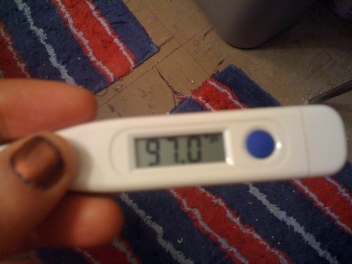Also see:
Melatonin Lowers Body Temperature
Menopausal Estrogen Therapy Lowers Body Temperature
Temperature and Pulse Basics & Monthly Log
Thyroid, Temperature, Pulse
Ray Peat, PhD on Thyroid, Temperature, Pulse, and TSH
“A slight decrease in temperature can promote inflammation (Matsui, et al., 2006). The thermogenic substances–dietary protein, sodium, sucrose, thyroid and progesterone–are antiinflammatory for many reasons, but very likely the increased temperature itself is important.” -Ray Peat, PhD
“For example, keeping cells in a well oxygenated state with thyroid hormone and carbon dioxide will shift the balance from estradiol toward the weaker estrone. The thyroid stimulation will cause the liver to excrete estrogen more quickly, and will help to prevent the formation of aromatase in the tissues. Low temperature is one of the factors that increases the formation of estrogen. Lactic acid, serotonin, nitric oxide, prostaglandins, and the endorphins will be decreased by the shift toward efficient oxidative metabolism.” -Ray Peat, PhD
J Neurosurg Anesthesiol. 2006 Jul;18(3):189-93.
Mild hypothermia promotes pro-inflammatory cytokine production in monocytes.
Matsui T, Ishikawa T, Takeuchi H, Okabayashi K, Maekawa T.
Hypothermia is often associated with compromised host defenses and infection. Deteriorations of immune functions related to hypothermia have been investigated, but the involvement of cytokines in host defense mechanisms and in infection remains unclear. We have previously shown that mild hypothermia modifies cytokine production by peripheral blood mononuclear cells. In this study, the effects of hypothermia on the monocytic production of several cytokines and nitric oxide (NO) were determined. Monocytes obtained from 10 healthy humans were cultured with lipopolysaccharide (LPS) under hypothermic (33 degrees C) or normothermic (37 degrees C) conditions for 48 hours. We performed flow cytometric analysis for simultaneous measurement of interleukin (IL)-8, IL-1beta, IL-6, IL-10, IL-12p70, and tumor necrosis factor (TNF)-alpha in culture supernatants. NO production was quantified as accumulation of nitrite in the medium by a colorimetric assay. Compared with normothermia, mild hypothermia raised the levels of IL-1beta, IL-6, IL-12p70, and TNF-alpha produced by monocytes stimulated with LPS. On calculating the ratios of these elevated cytokines to IL-10, however, only IL-12p70/IL-10 and TNF-alpha/IL-10 ratios were significantly elevated under hypothermic conditions. In contrast, hypothermia did not affect NO production. This study demonstrates that mild hypothermia affects the balance of cytokines produced by monocytes, leading to a pro-inflammatory state. Specifically, monocytic IL-12 and TNF-alpha appear to be involved in the immune alterations observed in mild hypothermia. However, the clinical significance of these phenomena remains to be clarified.

